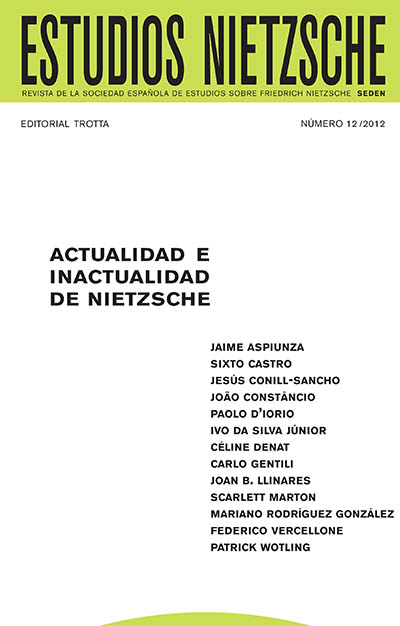The Human Enhancement from a Nietzschean Perspective
DOI:
https://doi.org/10.24310/EstudiosNIETen.vi12.10553Keywords:
human enhancement, great politics, eugenicsAbstract
This article shows Nietzsche’s conception of human enhancement from the perspective of «Great Politics» that reveals a connection with Francis Galton’s idea of eugenics, but implicates the criticism of the Darwinist concept of natural selection.
Downloads
Metrics
References
Bacon, F., La Nueva Atlántida, en Utopías del Renacimiento, México: FCE, 1996.
Bostrom, N., y J. Savulescu (eds.), Human Enhancement, New York: Oxford University Press, 2009.
Buchanan, A., (ed.), Genética y justicia, Madrid: Cambridge Univesity Press, 2002.
Campioni, G., «Von der Auflosung der Gemeinschaft zur Bejahung des 'Freigeistes'»: Nietzsche-Studien 5 (1976), 83-113.
Conill, J., El enigma del animal fantástico, Madrid: Tecnos, 1991.
Conill, J., El poder de la mentira. Nietzsche y la política de la transvaloración, Madrid: Tecnos, 1997.
Fukuyama, F., El fin del hombre. Consecuencias de la revolución biotecnológica, Barcelona: Ediciones B, 2002.
Galton, F., Inquiries into Human Faculty ant its Development, London, 1883 (en la biblioteca de Nietzsche).
Gracia, D., «Historia de la eugenesia», en Ética de los confines de la vida, Ética y Vida. Estudios de Bioética, vol. 3, Santafé de Bogotá: El Búho, 1998.
Gracia, D., «Problemas filosóficos de la ingeniería genética», en J.-R. Lacadena, D. Gracia, M. Vidal y F.J. Elizari, Manipulación genética y moral cristiana, Madrid: Fundación Universitaria San Pablo, 1988, pp. 94-116.
Haase, L., «Der Übermensch in 'Also sprach Zarathustra' und im Zarathustra-Na- chlass 1882-1885»: Nietzsche-Studien 13 (1984), pp. 242 ss.
Haase, M-L., «Nietzsche liest Francis Galton»: Nietzsche-Studien 18 (1989), 633-658.
Habermas, J., El futuro de la naturaleza humana. ¿Hacia una eugenesia liberal?, Barcelona: Paidós, 2002.
Kay, L. E., The Molecular Vision of Life. Caltech, the Rockefeller Foundation, and the Rise of the New Biology, New York: Oxford University Press, 1993.
Kevles, D.J., La eugenesia. ¿Ciencia o utopía?: polémica que dura cien años, Barcelona: Planeta, 1986;
Maienschei, J. y M. Ruse (eds.), Biology and the Foundations of Ethics, Cambridge, Cambridge University Press.
Nietzsche, F., Obras Completas, I-IV (OC ). Director ed. Diego Sánchez Meca. Madrid: Tecnos, 2011-2016
Nietzsche, F., Correspondencia I-VI. (CO). Director ed. Luis E. de Santiago Guervós. Madrid : Trotta, 2005- 2012.
Nietzsche, F., Fragmentos Póstumos I-IV (FP). Director ed. Diego Sánchez Meca. Madrid: Tecnos, 2006-2010.
Ottmann, H., Philosophie und Politik bei Nietzsche, Berlin: Gruyter, 21999, p. 243.
Romeo Casabona, C., (ed.), La eugenesia hoy, Granada: Comares, 2000;.
Sandel, M., Contra la perfección. La ética en la era de la ingeniería genética, Barcelona: Marbot, 2007.
Savulescu, J., R. T. Meulen y G. Kahane (eds.), EnhancingHuman Capacities, Oxford: Wiley- Blackwell, 2011.
Simon (ed.), J. Nietzsche und die philosophische Tradition, vol. 2, Würzburg: Konigshausen & Neumann, 1985, pp. 9-33.
Valadier, P., Nietzsche y la crítica del cristianismo, Madrid: Cristiandad, 1982.
Downloads
Published
How to Cite
Issue
Section
License
As of issue 21 (2021) this journal is published only in open access (diamond route).
From that number 21, like the previous numbers published in NIETZSCHE STUDIES, they are subject to the Creative Commons Acknowledgment-NoComercia-ShareIgual 4.0 license, the full text of which can be consulted at <http://creativecommons.org/licenses/by-nc-sa/4.0 >
It is the responsibility of the authors to obtain the necessary permissions of the images that are subject to copyright.
This work is licensed under a Creative Commons Attribution-NonCommercial-ShareAlike 4.0 International License.
Copyright generates two different rights: moral rights and patrimonial rights that EJFB recognizes and respects. Moral rights are those relating to the recognition of the authorship. They are rights of a personal nature that are perpetual, inalienable, unseizable and imprescriptible as consequence of the indivisible union of the author and his/her work.
Patrimonial rights are those that can be derived from the reproduction, distribution, adaptation or communication of the work, among others.







11.png)
